The Great Chicken Debate - Butchers vs Supermarket
For years, I have been a dictator when it comes to the food that enters our household. After seeing the many haunting images of animal cruelty in the meat industry, I decided once and for all that I would no longer eat cheap meat. 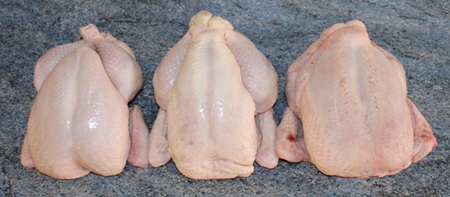
As a family, we now buy all our meat from our local butcher, who can tell us where each cut comes from - and in the case of our beef, it is from a farm a few miles away from our home.
One comment I have heard again and again from many different people when I say we buy all our meat from our local butchers is "But isn't that really expensive? I can get a whole chicken cheaper at the supermarket". While this may be true, my argument is that I will happily pay a bit more for a chicken to know its age and history. Additionally, it is my opinion that my chicken tastes better than anything I can buy at a supermarket, despite others' protests to the contrary.
Thus comes the Great Chicken Debate. My aim here is mainly to find out how much chicken you can get for your money.
I am not afraid to say I am biased when it comes to flavour, so for the most part, I shall keep the taste out of this experiment other than to say that a fuller flavour is worth the extra I pay.
I am looking to find the following information for the three chickens I purchased: -
- How much per kilo I paid for the raw chicken
- How much edible meat I get from the chicken vs the inedible waste
- Of that edible meat, how much per kilo did it really cost me
I bought two chickens from one of the big name supermarkets; one chicken was from the cheapest range available and the second was from the most expensive end. We also purchased a chicken from our local butcher.
I cooked all three chickens in the same oven, one after the other on the same day. I used the cooking instructions found on the packaging of the supermarket chickens which was 45 minutes per kilo plus 20-30 minutes as needed. As all three chickens were close to 2kg each, they all cooked for around an hour and forty five minutes.
Chicken 1:
This chicken was selected from the cheapest range we could find in the supermarket's value section. The packaging says that it meets welfare standards and states no water has been added. 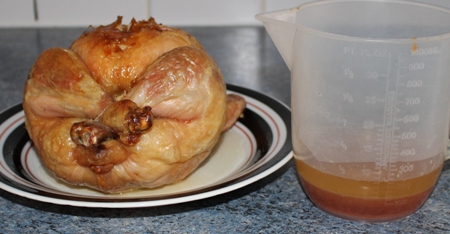
Further investigation has told us that this chicken is sourced solely from British supplying farms which meet the Red Tractor standards along with a strict Livestock Codes of Practice. The farmer checks every flock of birds at least twice a day, and their environment is constantly monitored to ensure their health and welfare - although no idea of age or environment is mentioned.
Although the company states that the birds live in specially designed houses and have access to food and water as well as room to move freely and behave naturally, at customer service we were simply told that if it doesn't say free-range or organic on the packet, it isn't and they could not confirm or deny how the chickens were reared. The Red Tractor assurance however does give some guarantee of the welfare standards that these young birds were treated by.
This chicken was:
- Price: £4.81
- Price per kilo: £2.48
- Raw weigh: 1.942kg
- Cooked weight: 1.367kg
Chicken 2:
The second chicken we chose was from the supermarkets Finest range and stated to be corn fed and free range. The packaging makes no statement about whether or not water was added to the chicken during the processing from farm to shelf. 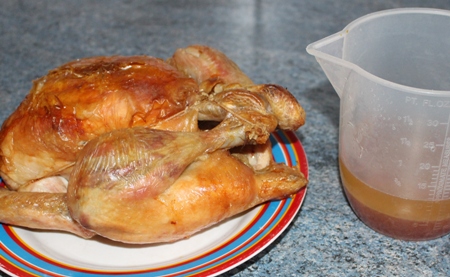
We have since found out that this Finest free-range chicken is from British farm assured farms and during daylight hours the birds are free to roam on grass ranges. Inside their houses straw bales are provided for the birds to perch on, enabling the birds to move about freely and naturally. This bird has been allowed to grow more slowly and has had a 50% maize inclusion in the feed which is all meant to contribute to a great flavour.
This chicken was:
- Price: £10.09
- Price per kilo: £5.00
- Raw weigh: 2.019kg
- Cooked weight: 1.313kg
Chicken 3:
This chicken was bought from our local butcher. Our butcher has told me in the past that the chickens he sells are older than those you buy in the supermarket. 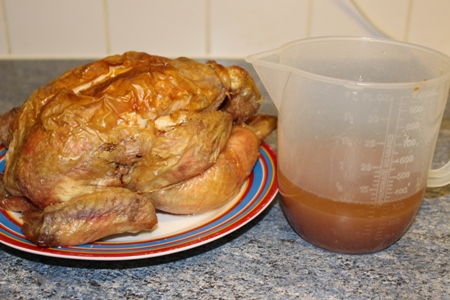
- Price: £10.89
- Price per kilo: £4.56
- Raw weigh: 2.389kg
- Cooked weight: 1.592kg
Once the chickens were cooked and cooled, we pulled them apart and separated each one into four piles: breast meat, leg meat, extra meat and waste. We then totalled up the weight of everything that could be eaten.
Taking into account the fact that some people will only eat leg or breast meat, we have two sets of results to factor in the extra meat which would mainly come off the back of the chicken, the wings and carcass. Using the original price we paid for the chicken, we calculated the cost of the amount of the chicken that would actually get eaten.
Chicken 1:
The total weight of breast and leg meat was 685g. This means that you would be paying £7.02 per kilo for this chicken if you were only to eat the breast and leg. There was a lot of meat left on the rest of the chicken. If you were to eat every piece of chicken, which totalled to 1079g, then you would be paying £4.46 per kilo but a lot of this meat was greyer in colour and had a slimier texture so we would personally discard this. The amount of fat vs stock was 50/50. 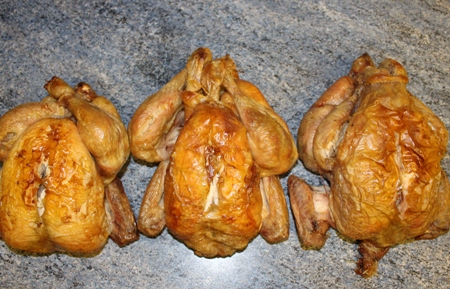
Chicken 2:
The weight of leg and breast meat on this chicken from the Finest range was 782g, thus you would be paying £12.89 per kilo for this meat alone. There wasn't as much extra meat so adding this to the leg and breast meant the meat only totalled to 934g meaning you would be paying £10.79 per kilo for everything edible off this chicken. The amount of fat vs stock was 50/50. The chicken did have a stronger corn flavour and most of the available meat was of a good texture.
Chicken 3:
The leg and breast on our butcher's chicken came in at 913g so it had cost us £11.92 per kilo. With the added extra meat the total edible weight came to 1089g, making it an even £10.00 per kilo. We find the extra meat on these chickens isn't at all slimy in texture and therefore we are more likely to eat everything the chicken has to offer. The amount of stock we recovered from this chicken was higher than the previous two and had less fat; possibly due to a more natural roaming lifestyle.
What our little experiment has shown me is that in the grand scheme of things, unless you live next door to a butcher, the difference in price between the high end supermarket chickens and a farm shop chicken is very small. We would point out that the local butchers chicken was actually cheaper gram for gram and had a more natural, fuller flavour - and we are also supporting our local independent business owner. In comparison, the meat from the value range was of a lower quality and had almost no flavour.
If you are making a separate journey out of town to a butchers just for a chicken any savings are off-set to the additional cost of the extra travel. However if you are really looking to change then buying all your meat on a fortnightly basis, as we do , from the butcher actually saves us in the long run and proves to be more cost effective.